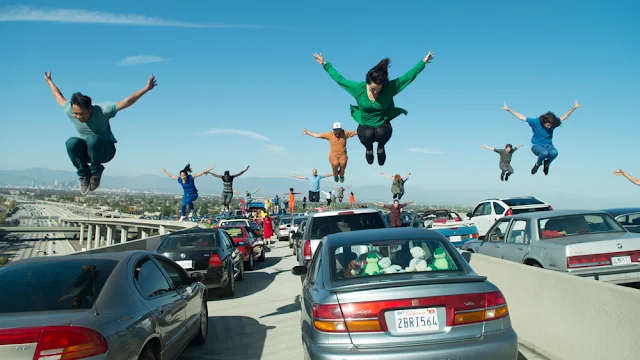Sebastian Wilder: Ryan Gosling
Mia Dolan: Emma Stone
Keith: John Legend
Laura Wilder: Rosemarie DeWitt
Greg Earnest: Finn Wittrock
Bill: J.K. Simmons
David: Tom Everett Scott
Director: Damien Chazelle
Screenplay: Damien Chazelle
Cinematography: Linus Sandgren
Production design: David Wasco
Film editing: Tom Cross
Music: Justin Hurwitz
Choreography: Mandy Moore
La La Land is an homage to an homage, which may be why it works so well. The acknowledged inspiration of Jacques Demy's The Umbrellas of Cherbourg (1964) and The Young Girls of Rochefort (1967), tributes to the Hollywood musicals of Vincente Minnelli and Stanley Donen, helps give Damien Chazelle's film the right ironic distancing. Without the tinge of melancholy that informs Demy's hommages, La La Land could have been just another campy pastiche, tongue-in-cheek nostalgia for a movie era that will never return. Ryan Gosling and Emma Stone were dinged by some critics for not being Fred and Ginger or Gene and Judy, movie stars who could actually sing and dance. But that's very much the point: Just as Gosling's Sebastian wants to be a jazz musician in an age that "hates jazz" and Stone's Mia longs to star in movies like Casablanca (Michael Curtiz, 1952) and Notorious (Alfred Hitchcock, 1946), they are stuck in the musical and cinematic present. There are no record companies or film studios that would cherish and nurture their dreams. Sebastian's jazz club becomes a "salsa/tapas" joint and even the Los Angeles revival house where he and Mia meet to watch Rebel Without a Cause (Nicholas Ray, 1955) closes soon afterward. Chazelle delicately, deftly plays on the frustration of being born out of time, witnessing a past turned rosy by nostalgia-tinted glasses. In this context, the skillfully done "what might have been" montage at the film's end, in which Seb and Mia live out the happy ending to their love affair that might have capped a real 1950s movie musical, brings home the bittersweet message: You can't have your dreams and eat them, too.
A blog formerly known as Bookishness / By Charles Matthews
"Dazzled by so many and such marvelous inventions, the people of Macondo ... became indignant over the living images that the prosperous merchant Bruno Crespi projected in the theater with the lion-head ticket windows, for a character who had died and was buried in one film and for whose misfortune tears had been shed would reappear alive and transformed into an Arab in the next one. The audience, who had paid two cents apiece to share the difficulties of the actors, would not tolerate that outlandish fraud and they broke up the seats. The mayor, at the urging of Bruno Crespi, explained in a proclamation that the cinema was a machine of illusions that did not merit the emotional outbursts of the audience. With that discouraging explanation many ... decided not to return to the movies, considering that they already had too many troubles of their own to weep over the acted-out misfortunes of imaginary beings."--Gabriel García Márquez, One Hundred Years of Solitude
Search This Blog
Showing posts with label Rosemarie DeWitt. Show all posts
Showing posts with label Rosemarie DeWitt. Show all posts
Friday, December 15, 2017
Tuesday, September 22, 2015
Kill the Messenger (Michael Cuesta, 2014)

This is a movie that will please no one who has first-hand acquaintance with any of the people supposedly portrayed in it, but the real problem with Kill the Messenger is that it has three great stories to tell and fails to tell any of them well. The first story is the one Gary Webb thought he had broken: the CIA connection to the crack cocaine epidemic. Given the complexity and range of that story, which will probably never be fully and accurately told, it's not surprising that the movie fails to do it justice. The second story is that of the frenzied politics of journalism, a story that probably holds little interest to anyone not involved in journalism and is hard to dramatize because there are so few clear-cut heroes and villains to be found in it. (And in any case, it has been superseded by another story: the slow demise of print journalism.) And finally, there's the story of the way reporter Gary Webb's involvement in the other two stories sent his life into a downward spiral. This is the story the movie chooses to concentrate on, but it does so in such a heavy-handed, cliché-raddled way, particularly with its focus on Webb's relationship with his wife (Rosemarie DeWitt) and teenage son (Lucas Hedges), that it doesn't make the tragic impact that it could have. I never met Gary Webb, and when the Sturm und Drang of "Dark Alliance" was taking place in the newsroom at the Mercury News, I was busy doing my thing in a far corner on the third floor back of the Merc's Ridder Park Drive plant. I recall that on the day the first story in the series appeared, a colleague said, "Well, Gary Webb just won us another Pulitzer." That was, of course, before the shit flung by the big papers in Washington, New York, and Los Angeles hit the fan. But it also revealed something about the way Pulitzer fever infected the Mercury News, as it does other newspapers. Webb was a victim of it, as was the Merc. There are things to like about the movie, mostly having to do with its performers, starting with Jeremy Renner as Webb. It's also good to see underused actors like Andy Garcia and Ray Liotta, and while nobody who knows the real Jerry Ceppos would ever have chosen Oliver Platt to play him, Platt does a good job of playing a man caught up in a whirlwind of competing pressures and managing to keep his head.
Subscribe to:
Posts (Atom)
